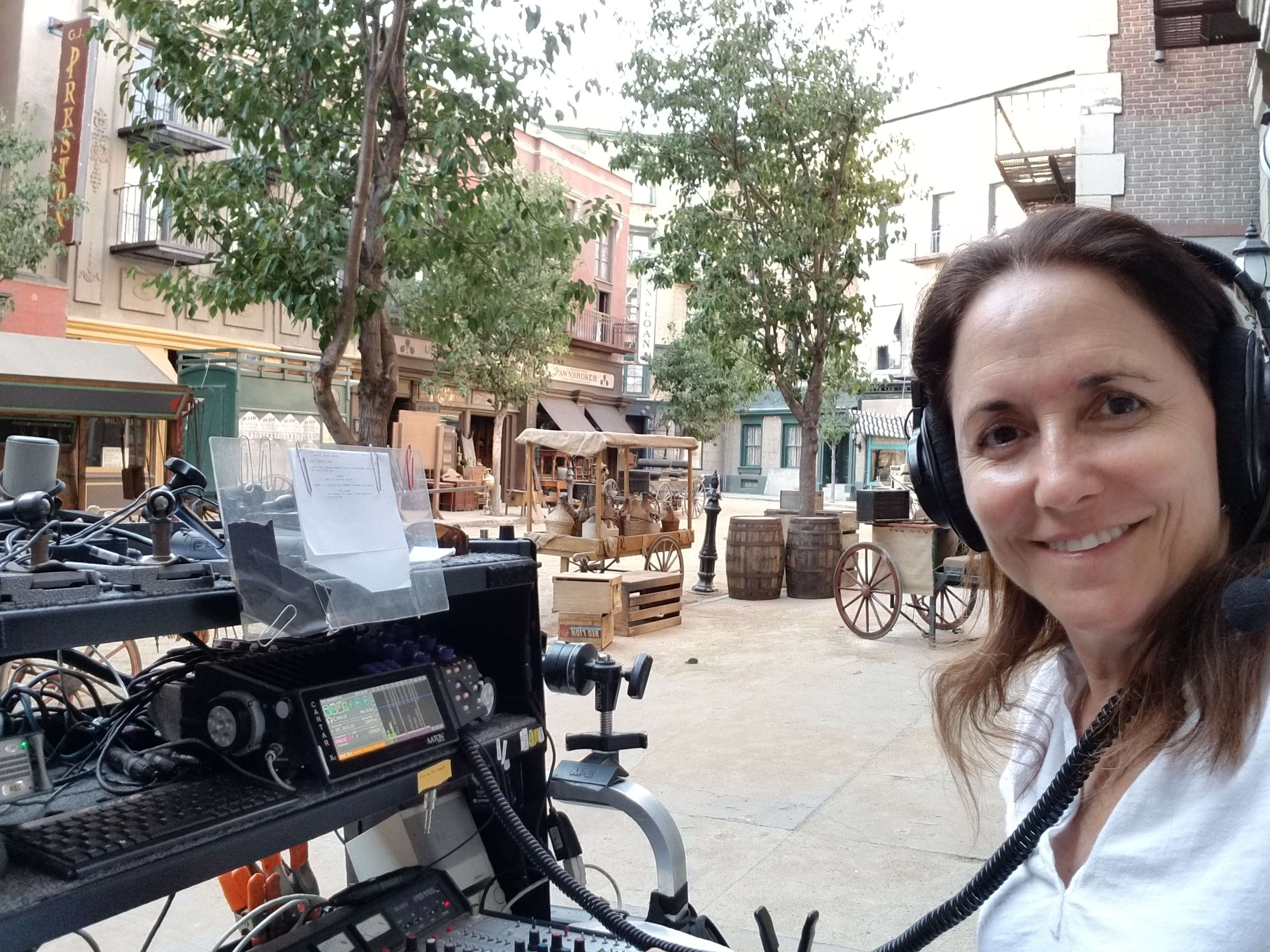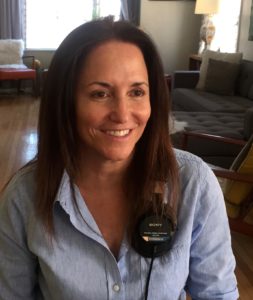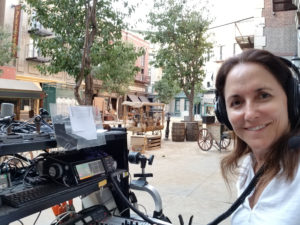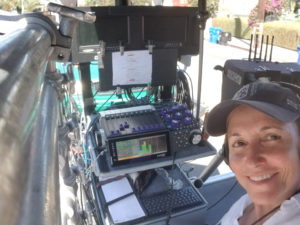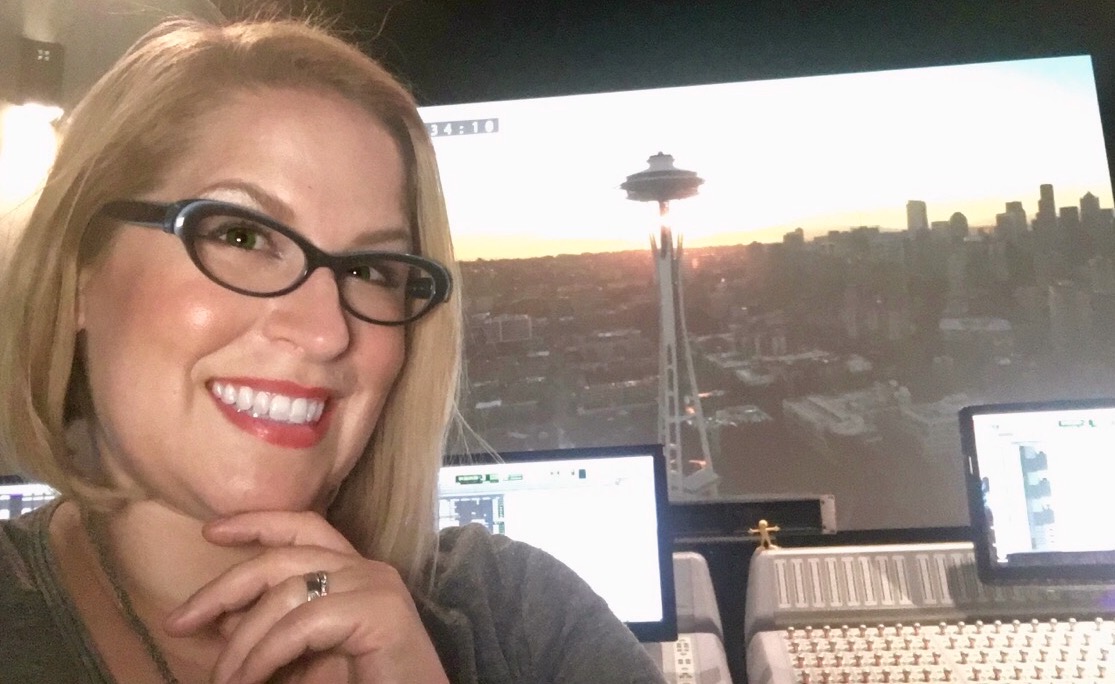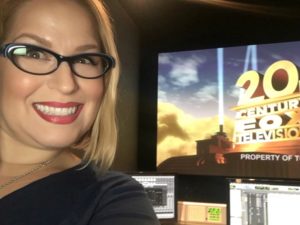
Finishing the Mix
Karol Urban CAS MPSE (Grey’s Anatomy, New Girl, Station 19, Band Aid, Breaking 2, #Realityhigh) re-recording mixer, has built a diverse list of mix credits spanning work on feature films, TV series (scripted and unscripted), TV movies, and documentaries over the last 18 years. Describing herself as “part tech geek and creative film nerd” she enjoys using her language skills to work in both English and Spanish.
Karol holds a BS from James Madison University in Audio Post Production from the School of Media Arts and Design, is on the Board of Directors for the Cinema Audio Society (CAS), is co-editor of the CAS Quarterly Magazine, and serves on the Governor’s Peer Group for Audio Mixing for the Television Academy.
While she is incredibly passionate about telling stories through sound, technology, and the art of the craft, her favorite aspect of her position is “the team sport of filmmaking and television production.”
Her enthusiasm and energy for the job help her retain a high work ethic. She is known for being a hard worker in and out of the studio.
What was your path getting into sound?
I was sight impaired as a child and benefited greatly from surgery. I still, however, have problems with depth perception and naturally gravitate toward sound as my primary sense of distance and spatial location.
I studied dance, piano, and voice as a child and went to the Governor’s School for the Performing Arts for high school. It is a public, county-supported, audition-based high school with a focused curriculum on the arts. I was fortunate to compose and record in my first recording studio there for the first time at the age of 13. I have been hanging out at one studio or another ever since.
Truthfully, I never wanted to perform. But sound and storytelling always fascinated me and held my attention steadfast. And I have always obsessed over the movies and loved narrative television. When I discovered you could work in sound, not necessarily music, and in sound for picture, I knew what I was going to do with my life. Every big move in my life I have made since has been to earn the next opportunity to tell a story through sound for picture.
I graduated high school a year early and went on to Virginia Tech at 17 where I took a lot of audio engineering classes. I transferred to James Madison University and majored in the School of Media Arts and Design with an audio concentration and minored in the music industry. I left school with the clear goal of becoming a re-recording mixer.
If you had to pick your favorite type of content, role or project what would it be and why?
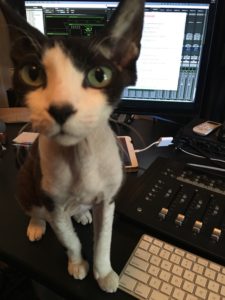
Personal Sound Assistant Sync
The collaborative aspect of what we do is to me the most precious, as a result, I love to be a part of larger teams as the dialog and music re-recording mixer. While it can be fun to do a single-person mix, especially if you have a very creative and collaborative producer or director, I am truly in heaven when I have a creative team behind me. Bring in the party. I love to craft the story as a collective.
I don’t really have a favorite genre. I love action and sci-fi, and I adore thrillers. Police procedurals are fun. But comedy and drama can be amazing too. I really enjoy the diversity of genres. It widens my toolset. Basically whatever genre I haven’t mixed in a while is my current favorite. I really do love it all.
The creative problem solving and technical aspect of cleaning and repairing dialogue is enjoyable, but I also love the subtle use of dynamics, reflections, and frequency details in dialogue mixing which can help you feel as if you are eavesdropping on a secret or hearing someone lose their composure. It is sneaky in that good dialogue mixing is rarely noticed while it is being most effective.
I also studied classical piano, voice, and composition for many years. I love music. Being able to craft the music into the final mix is a real honor and joy.
That’s why the dialogue/music re-recording chair feels like home.
A lot of people in post-production sound specialize in a single role (like dialog mixer, sound designer, etc.). How has it helped your career to not focus on one particular niche? Or, do you think there is an expectation now to be versatile?
I began my career in the mid-Atlantic region of the East Coast. There are people who work in post sound are often asked to perform all the roles (Foley recording, narration/ADR recording, Foley/ADR cueing, dialogue editorial, sfx editorial, and re-recording mix). Even if you were not working on a project as a single person, you and your team would often change roles to suit the schedule or client preferences. It is a different market for sure.
But, when I first got to Los Angeles, folks would advise that being a jack of all trades does not make you qualified to be a master of anyone. When I looked inside myself, I found that I was truly a dialogue-centered individual and macro thinker. I am an extrovert. I also love the subjective discussions and explorations that occur on the dub stage. All these aspects helped me excel as a dialogue and music re-recording mixer.
But, over the last eight years, I’ve noticed that the ability to diversify is becoming more valued in LA. In this way, I may have chosen the perfect time to come to LA, with a clear, specific goal on what I prefer to center my focus on, but enough diverse experience and knowledge in multiple fields of post sound to be usefully skilled. I gladly switch roles when needed; a change is often good for perspective.
Can you talk about transitioning from working in DC to Los Angeles? Since you didn’t have a job lined up in LA, how did you decide it was time to move?
I am a true believer in the concept that knowledge is power. I had reached a point in DC where I was feeling a little stagnant. I wasn’t learning as much, wasn’t experimenting as much, and wasn’t challenged enough. I was struggling to find opportunities where I could make myself wonderfully uncomfortable with a challenge. I was searching for mentors.
I found a short, small contract in LA and left a job of 10 years with crazy benefits, paid vacation, and a very decent salary to seek out the challenge. Finding a gig, even one as short as a 3-month contract, while on the other side of the country seemed like a sign.
At the time I was frightened that I wouldn’t be capable of competing in such a large and complex market. But I knew I would never stop wondering “what if.” Once a few months passed, and I took a couple of professional punches to the face, I recognized I had learned a ton and began noticing a difference in my work. I got excited. There is no other option other than success. Moving to LA has proven to be the most wonderful adventure I have ever had in my life. I love it here. I love the market, the challenges, and the ever-changing, seemingly endless possibilities. There is so much to learn and grow from here. I am grateful.
Can you walk us through an average work week for you? How many hours are you working, spending outside the studio on other work-related demands, etc.?
The amount I actually mix depends on the projects I am on. Sometimes it is 16 hour days and six-day weeks other times it might be two days a week for 9 hours a day. Production schedules move erratically and the day is not over when it is scheduled to end or when you are done… it is over when the client feels whole, and they are done. My life is a continual game of scheduling Jenga. The terrain is insane. It is awesome and exhausting.
When I am not in the chair mixing, I am still working. Mixing is only part of the job. I try to be a resource for others as much as possible. I give back to my community through volunteer service in the MPSE, CAS, & TV Academy, edit the CAS Quarterly publication, meet with industry folks new to town, and of course, establish new relationships in the community. It is a rare day off when I don’t meet up with someone, watch a tutorial on new technology, or volunteer on a project. I keep an ear open for any industry positions available and try to recommend people in my network that I know can tackle the duties and forward their careers. It is all-encompassing, but I love what I do and I simply never tire of the hustle. Don’t get me wrong, there are days or weeks where I am truly exhausted, but I never dream of doing anything else. I want to be the best I can be, and I feel like I have incredible joy ahead of me in that I have much more growing to do. I am not even close to done.
What are the differences between mixing documentary/reality and scripted?
Depends on your project and your client.
There are certainly workflow and logistical differences, and there also tends to generally be a larger expectation of detail and desire for the school of perspective mixing in scripted media. But the core of what I do is really only made different by the client’s desires and the needs of the film/project.
I certainly will repair, clean, and fit the spec. But the true value in having a re-recording mixer is that you have a professional who is a life-listener and skilled craftsperson. We study and develop sound as a storytelling tool that can steer the minds of the viewers. I certainly have had projects of all genres that demand and expect narrative storytelling in their mix. I have also had many projects of all genres that look to me for technical audio triage and to emulate their temp track. It is less genre-specific than project-specific.
Can you explain how a 2-person mix works?

Karol and Steve Urban on the movie BFFs
There are many ways to work. It depends on the team, the technology, and the project’s scheduled mix time. In the end, however, the goal is to make sound decisions and become four hands and two minds working with the singular focus of intensifying the story through sound. It really is a wonderful way to work.
On a 2-person mix, what are the challenges of working with a mixer you haven’t mixed with before?
Sometimes you don’t know the perspective or tastes of your partner when you are newly paired or the tempo at which they need to work. You have to learn the sensibility of your partner as soon as possible. Luckily most folks who mix in multiple-seat dub stages are very collaborative and have the ability to morph to the style that works with the team and serves the director or producer. I have certainly been made aware of other ways of looking at things that ended up being the right choice for the project and client at the end of the day. This difference of perspective can be a complexity and/or a gift.
You’ve mixed over 100 episodes of Grey’s Anatomy. What are the challenges?
We suffer from a lot of set noise as there is a lot of busy scenes with lots of background action…IV stands, gurneys, and of course, paper medical gowns.
You have a reputation for having an incredible work ethic, drive, and energy level. How do you maintain that level of focus? How do you not burn out?
Wow. That’s a crazy question. It blows me away that I have a reputation at all. I just keep swimming.
I have had a very specific and pointed goal for a very long time to be a re-recording mixer. It started as soon as I knew the job existed. I knew it was what I was supposed to do. I never took a lot of electives in school or tried a lot of different things professionally because this goal was what I knew I wanted specifically. I knew it was competitive and I knew I wouldn’t generally look like or come from the same places that a lot of my peers would. I grew up in a town that simply doesn’t have a substantial market for this craft. I knew it was a different world and I was going to have to break in.
Practically every extracurricular activity, club, or group I have participated in has been focused on trying to be in this world. Sound makes sense to me and communicating by putting people in sound spaces is pretty amazing and evocative. I am always trying to make myself worthy and valuable to the opportunity in front of me.
What skills are necessary to do your job?
You have to be at least mildly obsessed with detail, technology, and storytelling. Our jobs are not sprints; they are marathons. You will watch a reel or episode over and over and over again for days, sometimes weeks. You must remain present and have the ability to fall back into the perspective of a first-time viewer but also switch quickly to the mind of a mixer. You have to be able to see (and feel and hear) the effect of what you are doing while also seeing possibilities.
It is also very helpful to like people and have no ego. It can be hard sometimes because you have to emotionally experience something in order to create and having that emotional response rejected can feel personal. But in the end, you are completing the vision of your director or producer and creating their film/show. You should understand that a person may be inspired by your suggestion at times but may also feel something completely different. Notes are not criticism. They are opportunities.
What are your favorite plugins?
I am loving the Pro Fabfilter Q2 and De-esser right now. I also love my McDSP SA-2 and NF575. I am still a sucker for Audio Ease’s Speakerphone, and PhoenixVerb is pretty amazing.
What technology are you excited about right now?
I love the new immersive formats. I really feel a naturalness when I hear an environment in Atmos. And I love the panning precision and full-range reproduction.
What have been the challenges for you as a woman in the field?
It is getting so much better. I have definitely found myself in moments of overt creepiness and absolute inappropriateness. But as the years have gone on whether it be because we as a society are becoming more progressive, other women have paved the way, or because I have become more established, it has gotten much, much better. I just keep forging ahead. I don’t give that crazy a lot of focus. The best thing I can do for equality is to be successful as a woman and be a force for equality by treating everyone around me the way I would want to be treated. I try to lift others up who share the love of what we do, and I take no mind in their gender, race, or creed.
I still have to discuss my gender as an anomaly from time to time, almost always on a new job and have to occasionally educate people on my knowledge and fandom of a diverse range of genres such as action, horror, and sci-fi. Because as a woman I am often thought of as a strictly romantic comedy or drama person.
But I do have to take care to go out of my way to get to know my co-workers and let them know they can be comfortable around me and that they can be confident that I am an assertive individual. People don’t walk on eggshells around me because I will let someone know if I am uncomfortable or disagree. I hold no grudges and pull no punches. I have been set straight once or twice in my life when I have said something I thought was harmless that had no presumptions behind it that accidentally affected someone in a negative way. We all need to be open to learning from one another without fear or pride. I do believe most people are intrinsically good.
It is paramount to respect your coworkers (male and female alike). While I am aware of situations through the years where I have not been hired because I am a woman or where criticism has been very blatantly gender-biased, I know I am also here in my dream job because of all the wonderful folks, the majority of whom are male, who have given me a shot, had confidence in my abilities and welcomed me into the fold.
It is a weird landscape, ladies.
What advice would you give women in our field?
Be assertive, persistent, and consistent. Respect the contributions of everyone around you from the valet service to reception to account management to your engineer. Show respect and act respectfully. Expect the same in return. Be humble but also speak and act with confidence and kindness. Some folks really do not recognize what they are saying. Some are uncomfortable or culturally insensitive without knowledge of their actions. Ignorance does still exist. Some folks lack perspective and understanding without intending ill will. Many people who are considered notoriously challenging that I have worked with were not an issue with me at all because if I had an issue, I stated the issue, explained my issue, asked for a change in behavior, and then dropped it from my memory and became a friend and advocate to them. And while I am not so ignorant or smug as to say it doesn’t matter what others think or do (There is real malice in the world.), I do believe social transformation happens individual by individual. We can be seeds of change by keeping our decisions untarnished by the poor actions of a few and giving each new individual in our world the opportunity to be wonderful.
I believe in equality. I can’t wait to work in a world where we don’t have to support each other as minorities but we can just support competent, talented artists and craft people and diversity will naturally take place.
If you were to guide someone trying to get into post-production today what advice would you give? What would you advise to find work and build a career?
Don’t wait for someone to give you permission to do what you want to do. Even if it is for little or no money, get in there. Until you have a professional-level skill to offer, you need to be doing what you can to acquire it. Participate in your community, seek mentors, seek other folks coming up, collaborate, create, rise, and lift up others. Remain open to life lessons. The universe has a lot more opportunities to reward you with when you put yourself out there and participate.

